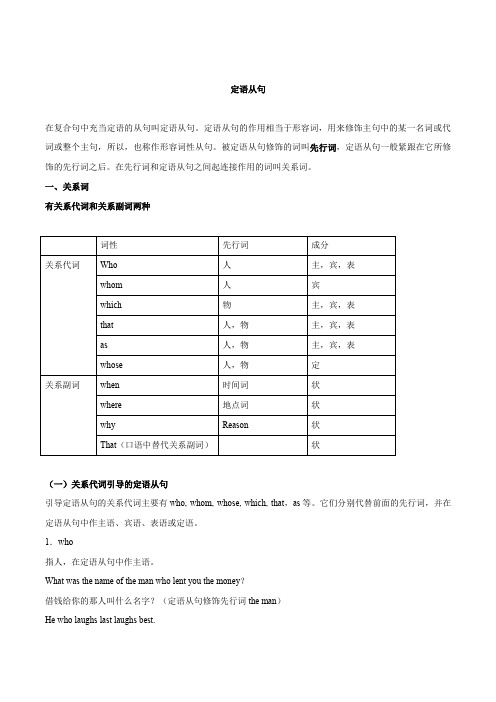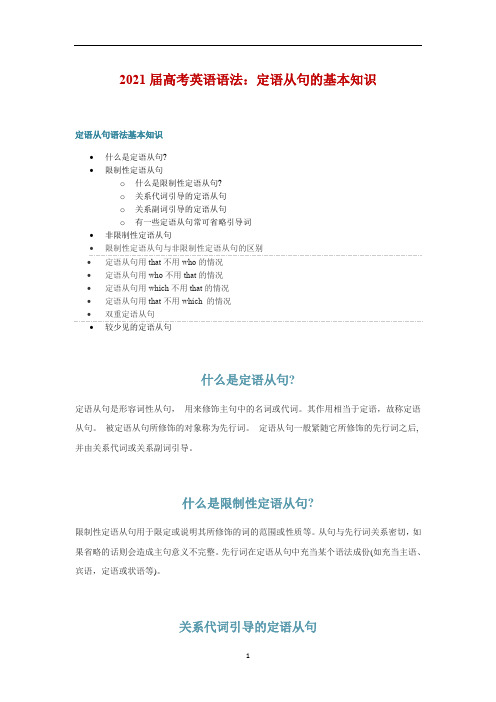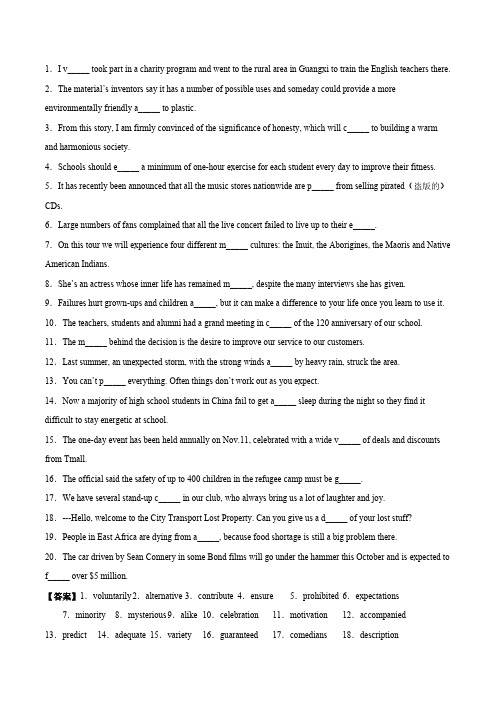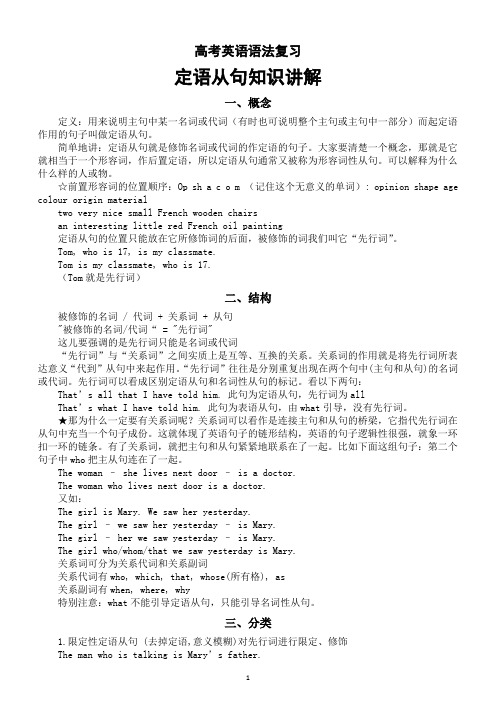雪定语从句
高考定语从句知识点总结

高考定语从句知识点总结定语从句是英语中非常重要和常见的一种语法结构,也是高考中经常考察的知识点之一。
定语从句用来修饰一个名词或代词,起到进一步说明或限制的作用。
本文将结合例子对高考中常考的定语从句知识点进行总结。
一、定义和基本结构定语从句是一个从句,由引导词(也称为关系词)引导并与名词或代词相连,加以修饰。
引导词包括关系代词和关系副词。
关系代词包括:that, which, who, whom, whose。
关系副词包括:where, when, why。
定语从句的基本结构为:关系代词/关系副词 + 先行词。
二、关系代词的用法1. that: 用于人或事物,在定语从句中作主语或宾语。
例句1:The book that you lent me is very interesting.例句2:This is the school that I used to study in.2. which: 用于事物,在定语从句中作主语或宾语。
例句1:I bought a new computer, which is very expensive.例句2:This is the house which my grandparents lived in.3. who: 用于人,在定语从句中作主语。
例句1:The girl who is sitting next to me is my best friend.例句2:I know a man who can speak five languages.4. whom: 用于人,在定语从句中作宾语。
例句1:He is the boy whom I met at the party.例句2:She is the teacher whom I respect a lot.5. whose: 用于人或事物,在定语从句中表示所属关系。
例句1:I have a friend whose father is a doctor.例句2:This is the company whose products are very popular.三、关系副词的用法1. where: 用于地点,在定语从句中表示地点。
高中英语语法:定语从句精华知识点复习

定语从句在复合句中充当定语的从句叫定语从句。
定语从句的作用相当于形容词,用来修饰主句中的某一名词或代词或整个主句,所以,也称作形容词性从句。
被定语从句修饰的词叫先行词,定语从句一般紧跟在它所修饰的先行词之后。
在先行词和定语从句之间起连接作用的词叫关系词。
一、关系词有关系代词和关系副词两种(一)关系代词引导的定语从句引导定语从句的关系代词主要有who, whom, whose, which, that,as等。
它们分别代替前面的先行词,并在定语从句中作主语、宾语、表语或定语。
1.who指人,在定语从句中作主语。
What was the name of the man who lent you the money?借钱给你的那人叫什么名字?(定语从句修饰先行词the man)He who laughs last laughs best.谁笑到最后谁笑得最好。
(定语从句修饰先行词he)The chairman of the meeting, who spoke first, sat on my right.会议主席坐在我右边,他先发言。
(定语从句修饰先行词the chairman)2.whom指人,在定语从句中做宾语。
在口语或非正式文体中,whom可省略或可用who来代替,但在介词后面以及在非限制性定语从句中只能用whom。
There are some people (whom/who)we like and others (whom/who) we dislike.有些人我们是喜欢的,有些人则是我们讨厌的。
(定语从句分别修饰先行词people, others)The people whom I work with are all friendly.和我一起工作的人都很友好。
(定语从句修饰先行词the people,介词后)Mr Carter, whom I spoke to on the phone last night, is very interested in our plan.昨晚我在电话里和卡特先生交谈过,他对我们的计划很感兴趣。
高中化学定语从句专项语法讲解

高中化学定语从句专项语法讲解什么是定语从句?定语从句是一种修饰前面名词或代词的从句。
它通常通过引导词(关系代词或关系副词)来引导,将一个句子作为修饰语与名词或代词相连。
定语从句的引导词常见的定语从句引导词有:- 关系代词:that, which, who, whom, whose that, which, who, whom, whose- 关系副词:where, when, why where, when, why定语从句的位置和构成定语从句通常紧跟在被修饰的名词或代词之后。
定语从句的基本构成包括以下要素:- 引导词(关系代词或关系副词)- 主语- 谓语- 宾语- 其他修饰成分定语从句的功能定语从句在句子中起到限定或说明作用,它可以:- 限制范围:通过定语从句可以限制名词或代词的范围,使其更具体可辨。
- 说明特征:定语从句可以提供更多关于名词或代词的信息,帮助读者更好地理解上下文。
定语从句的例子以下是一些定语从句的例子:- She is the girl who helped me yesterday.(她是昨天帮助过我的女孩。
)who helped me yesterday.(她是昨天帮助过我的女孩。
)- The book that I borrowed from the library is very interesting.(我从图书馆借来的那本书很有趣。
)that I borrowed from the library is very interesting.(我从图书馆借来的那本书很有趣。
)- This is the place where we met last time.(这是我们上次见面的地方。
)where we met last time.(这是我们上次见面的地方。
)注意事项在使用定语从句时,需要注意以下几点:- 引导词的选择:根据定语从句所修饰的名词或代词的特点和要求选择合适的引导词。
高考英语语法:定语从句的基本知识

2021届高考英语语法:定语从句的基本知识定语从句语法基本知识•什么是定语从句?•限制性定语从句o什么是限制性定语从句?o关系代词引导的定语从句o关系副词引导的定语从句o有一些定语从句常可省略引导词•非限制性定语从句•限制性定语从句与非限制性定语从句的区别•定语从句用that不用who的情况•定语从句用who不用that的情况•定语从句用which不用that的情况•定语从句用that不用which 的情况•双重定语从句•较少见的定语从句什么是定语从句?定语从句是形容词性从句,用来修饰主句中的名词或代词。
其作用相当于定语,故称定语从句。
被定语从句所修饰的对象称为先行词。
定语从句一般紧随它所修饰的先行词之后, 并由关系代词或关系副词引导。
什么是限制性定语从句?限制性定语从句用于限定或说明其所修饰的词的范围或性质等。
从句与先行词关系密切,如果省略的话则会造成主句意义不完整。
先行词在定语从句中充当某个语法成份(如充当主语、宾语,定语或状语等)。
关系代词引导的定语从句1) 由that 引导的定语从句that 可以指人或物。
在定语从句中作主语、宾语或表语,作宾语或表语时可以省略。
* The man that visited our school is from Australia.到访我们学校的那个人来自澳大利亚。
* Is oxygen the only gas that helps fire burn? 氧气是唯一的助燃气体吗?* The girl (that) I saw is called Mary. 我见到的那个女孩名叫玛丽。
* Is there anything else (that) you require? 你还需要别的东西吗?* My hometown is no longer the place (that) it used to be. 我的家乡再也不是以前那个样子了。
2)由which 引导的定语从句which 指物,在定语从句中作主语或宾语。
2021高二英语寒假作业同步练习题:非限制性定语从句(含答案)

1.I v_____ took part in a charity program and went to the rural area in Guangxi to train the English teachers there. 2.The material’s inventors say it has a number of possible uses and someday could provide a more environmentally friendly a_____ to plastic.3.From this story, I am firmly convinced of the significance of honesty, which will c_____ to building a warm and harmonious society.4.Schools should e_____ a minimum of one-hour exercise for each student every day to improve their fitness. 5.It has recently been announced that all the music stores nationwide are p_____ from selling pirated(盗版的)CDs.6.Large numbers of fans complained that all the live concert failed to live up to their e_____.7.On this tour we will experience four different m_____ cultures: the Inuit, the Aborigines, the Maoris and Native American Indians.8.She’s an actress whose inner life has remained m_____, despite the many interviews she has given. 9.Failures hurt grown-ups and children a_____, but it can make a difference to your life once you learn to use it. 10.The teachers, students and alumni had a grand meeting in c_____ of the 120 anniversary of our school. 11.The m_____ behind the decision is the desire to improve our service to our customers.12.Last summer, an unexpected storm, with the strong winds a_____ by heavy rain, struck the area.13.You can’t p_____ everything. Often things don’t work out as you expect.14.Now a majority of high school students in China fail to get a_____ sleep during the night so they find it difficult to stay energetic at school.15.The one-day event has been held annually on Nov.11, celebrated with a wide v_____ of deals and discounts from Tmall.16.The official said the safety of up to 400 children in the refugee camp must be g_____.17.We have several stand-up c_____ in our club, who always bring us a lot of laughter and joy.18.---Hello, welcome to the City Transport Lost Property. Can you give us a d_____ of your lost stuff? 19.People in East Africa are dying from a_____, because food shortage is still a big problem there.20.The car driven by Sean Connery in some Bond films will go under the hammer this October and is expected to f_____ over $5 million.【答案】1.voluntarily2.alternative3.contribute4.ensure5.prohibited6.expectations 7.minority8.mysterious9.alike10.celebration11.motivation12.accompanied 13.predict14.adequate15.variety16.guaranteed17.comedians18.description19.starvation20.fetch【解析】1.考查副词。
高中英语2024届高考语法复习定语从句知识讲解(共十一个方面)

高考英语语法复习定语从句知识讲解一、概念定义:用来说明主句中某一名词或代词(有时也可说明整个主句或主句中一部分)而起定语作用的句子叫做定语从句。
简单地讲:定语从句就是修饰名词或代词的作定语的句子。
大家要清楚一个概念,那就是它就相当于一个形容词,作后置定语,所以定语从句通常又被称为形容词性从句。
可以解释为什么什么样的人或物。
☆前置形容词的位置顺序:Op sh a c o m (记住这个无意义的单词): opinion shape age colour origin materialtwo very nice small French wooden chairsan interesting little red French oil painting定语从句的位置只能放在它所修饰词的后面,被修饰的词我们叫它“先行词”。
Tom, who is 17, is my classmate.Tom is my classmate, who is 17.(Tom就是先行词)二、结构被修饰的名词 / 代词 + 关系词 + 从句"被修饰的名词/代词“ = "先行词"这儿要强调的是先行词只能是名词或代词“先行词”与“关系词”之间实质上是互等、互换的关系。
关系词的作用就是将先行词所表达意义“代到”从句中来起作用。
“先行词”往往是分别重复出现在两个句中(主句和从句)的名词或代词。
先行词可以看成区别定语从句和名词性从句的标记。
看以下两句:That’s all that I have told him. 此句为定语从句,先行词为allThat’s what I have told him. 此句为表语从句,由what引导,没有先行词。
★那为什么一定要有关系词呢?关系词可以看作是连接主句和从句的桥梁,它指代先行词在从句中充当一个句子成份。
这就体现了英语句子的链形结构,英语的句子逻辑性很强,就象一环扣一环的链条。
写冬天英语的定语从句
1.The snowman, whose carrot nose glistens in the sunlight, is a creation of joy forthe children. (雪人,胡萝卜鼻子在阳光下闪闪发光,是孩子们的欢乐之作。
)2.The icicles, that hang from the rooftops, create a dazzling spectacle in the wintersun. (悬挂在屋顶的冰柱,在冬日的阳光下形成了令人眼花缭乱的景象。
)3.The winter jacket, which keeps me warm and cozy, was a thoughtful gift from mygrandmother. (冬季夹克,让我感到温暖舒适,是我奶奶贴心的礼物。
)4.The holiday lights, that decorate the streets and houses, bring a festive and joyfulatmosphere to the neighborhood. (装点着街道和房屋的节日灯光,给邻里带来了一种节日和欢乐的氛围。
)5.The fireplace, where flames dance gracefully, provides a warm refuge on chillywinter evenings. (壁炉,火焰优雅地舞动,是在寒冷冬夜中温暖的庇护所。
)6.The winter constellations, that twinkle in the clear night sky, tell captivatingmythological stories. (冬季的星座,在晴朗的夜空中闪烁,讲述着引人入胜的神话故事。
)7.The gingerbread house, that we make every Christmas, is adorned with sweetcandies and festive decorations. (每年圣诞节我们制作的姜饼屋,用甜蜜的糖果和节日装饰装点着。
同位语从句和定语从句的区别例子
同位语从句和定语从句的区别例子1. 哎呀呀,你们看这个句子“我喜欢那个总是面带微笑的女孩”,这里的“总是面带微笑的”就是定语,用来修饰“女孩”,这就是定语从句啦。
再比如“消息传来我们队赢了这场比赛,这消息真让人兴奋啊”,这里的“我们队赢了这场比赛”就是同位语从句呀,它解释说明了“消息”的具体内容呢!2. 嘿,想想啊,“他买了一朵开得非常鲜艳的花”,这里“开得非常鲜艳的”不就是定语嘛,这就是典型的定语从句哟。
而“他得知明天会下雪这个事实,高兴得跳了起来”,那“明天会下雪”不就是在说“事实”嘛,这就是同位语从句呀,懂了不?3. 哇塞,“那个穿着红色裙子的女士很漂亮”,“穿着红色裙子的”就是定语,这例子很清楚吧,这就是定语从句嘛。
再看“她知道自己考了第一名这个消息后,激动得大喊大叫”,“自己考了第一名”就是同位语从句呀,怎么会分不清呢?4. 哈哈,“我有一个每天都坚持锻炼的朋友”,“每天都坚持锻炼的”就是定语,这就是定语从句啦。
“我们听说电影要延期上映这个消息,都有点失望”,“电影要延期上映”就是来解释“消息”的呀,这就是同位语从句,很简单吧!5. 哟呵,“那只长得很可爱的小狗真讨人喜欢”,这“长得很可爱的”就是定语,属于定语从句哦。
“他们发现地球是圆的这个事实,当时震惊了所有人”,“地球是圆的”就是同位语从句啦,是不是恍然大悟啦?6. 天哪,“这位说话很温柔的老师很受欢迎”,看看,“说话很温柔的”就是定语,定语从句呢。
“我们得到了班长生病了这个消息,都很担心他”,“班长生病了”就是同位语来对“消息”解释说明呀,这下能区分开了吧!7. 哎呀,“那辆速度超级快的汽车一闪而过”,“速度超级快的”是定语哦,是定语从句呀。
“他终于承认他说谎了这个事实,让人很惊讶”,“他说谎了”就是同位语从句,明白了不?8. 哼,“那个一直鼓励我的人我永远不会忘记”,“一直鼓励我的”就是定语呀,这就是定语从句嘛。
“我们知道了明天是周末这个事实,开心极了”,“明天是周末”就是同位语从句呀。
英语语法解析 限制性定语从句和非限制性定语从句的区别
英语语法解析限制性定语从句和非限制性定语从句的区别定语从句分为限制性定语从句和非限制性定语从句。
1.作用的区别限制性定语从句是先行词不可缺少的一部分,起着限定,约束先行词的作用。
如果去掉定语从句,主句的含义会不完整或不明确。
非限制性定语从句与主句的关系不密切,起到附加说明的作用,如果去掉定语从句,主句的意义还相对完整。
The digital age also enables us to find people who share our interests. 数字时代也使我们能够找到和我们有共同兴趣的人。
(如果去掉定语从句主句含义不明确)The book, which I bought yesterday, was written by Moyan.这本书是莫言写的,我是昨天买的。
(如果去掉定语从句主句含义相对完整)2.有无逗号的区别限制性定语从句与主句之间没有逗号隔开;非限制性定语从句与主句之间有逗号隔开。
3.关系词的区别①限制性定语从句的关系词作宾语时可以省略;非限制性定语从句的关系词作宾语时不可以省略。
He is a student who/whom/that the teachers like very much. 他是老师们非常喜欢的学生。
(who/whom/that在定语从句中作宾语,可以省略。
)The house, which I bought three years ago, has a very large yard. 这所房子是我三年前买的,有一个很大的院子。
(which在定语从句中作宾语,不可以省略)②限制性定语从句关系词可以用that;非限制性定语从句不可以使用that,指人时用who,指事物或情况时用which。
Mr Smith, who was my form teacher, visited my home last weekend. 史密斯先生上周末来我家了,他是我的班主任。
英语从句辨析50个例句
英语从句辨析50个例句全文共四篇示例,供读者参考第一篇示例:英语从句是英语语法中一个非常重要的部分,许多学习者在学习英语的过程中经常会混淆各种不同类型的从句,导致语言表达不够准确。
在这里将带大家练习50个不同类型的英语从句,帮助大家更好地理解和运用英语从句。
1. 偏转疑问句:请你把那本书给我好吗?Can you please give me that book?2. 定语从句:这是我买的鞋。
These are the shoes that I bought.4. 原因状语从句:因为我生病了,所以我没有去上学。
I didn't go to school because I was sick.7. 目的状语从句:我帮他学习,以便他能及时完成作业。
I helped him study so that he could finish his homework on time.8. 地点状语从句:你在哪里见到他的?Where did you see him?10. 比较状语从句:我比他更高。
I am taller than him.12. 主语从句:你是否知道他的名字?Do you know what his name is?16. 虚拟语气从句:如果我是你,我会努力学习。
If I were you, I would study hard.21. 结果从句:他努力学习,因此取得了很好的成绩。
He studied hard, so he got very good grades.23. 地点从句:我不知道在哪里可以买到这本书。
I don't know where to buy this book.31. 让步从句:尽管天气很冷,但他准时到达了。
Despite the cold weather, he arrived on time.34. 结果从句:他下了很多功夫,终于通过了考试。
He put in a lot of effort and finally passed the exam.45. 条件从句:如果你明天去购物,记得给我买件新衣服。
- 1、下载文档前请自行甄别文档内容的完整性,平台不提供额外的编辑、内容补充、找答案等附加服务。
- 2、"仅部分预览"的文档,不可在线预览部分如存在完整性等问题,可反馈申请退款(可完整预览的文档不适用该条件!)。
- 3、如文档侵犯您的权益,请联系客服反馈,我们会尽快为您处理(人工客服工作时间:9:00-18:30)。
■有关定语从句的概念(1)定语从句:就是在复合句里充当定语的从句,它通常紧靠在所修饰的名词或代词后面。
(2)先行词:就是被定语从句修饰的名词或代词。
(3)关系词:引导定语从句的词叫关系词。
关系词有关系代词who, whom, whose, which 和that等;关系副词有when, where, why等。
关系词不仅起连接作用,而且还代表先行词并在定语从句中担任某一句子成分,关系代词作主语、宾语、定语、表语等,关系副词作状语。
如:This is the book that my father bought me yesterday. 这就是我父亲昨天帮我买的那本书。
说明:句中修饰the book的that my father bought me yesterday就是定语从句;被定语从句所修饰的the book这是先行词;代表the book的关系代词that在定语从句中作bought的直接宾语。
The time when he arrives is not known. 他到达的时间还不知道。
说明:句中when he arrives是定语从句,被定语从句修饰的the time是先行词,关系副词when作时间状语。
■关系代词的一般用法先行词是人,在从句中作主语用who,作宾语用whom或who,作定语用whose;先行词是物,在定语从句中作主语或宾语都用which,作定语用of which或whose均可。
在限制性定语从句中which, who, whom都可用that代替。
关系代词作宾语时常被省略。
This is the man who helped me yesterday. 这就是昨天帮助我的那个人。
(作主语) The teacher (who/whom/that) you want to see is coming. 你要见的老师来了。
(作see的宾语,可以省略)I met a boy whose father was a astronaut. 我认识一位男孩,他的父亲是宇航员。
(作定语)Here is the coat which/that will be made to you. 这是一件做给你的衣服。
(作主语)This is the factory (which/that) we visited last year.这就是我们去年参观的那家工厂。
(作visited的宾语,可以省略)He has a book whose cover (=the cover of which) is very beautiful. 他有一本封面非常漂亮的书。
■关系副词的一般用法关系副词有when, where, why,在定语从句中作状语,分别表示时间、地点和原因。
when的先行词通常是time, day, season, age, occasion等时间名词;where的先行词通常是place, city, town, village, house, case, situation, scenes等地点或情形名词;why的先行词只能是reason。
关系副词when和where有时可用“介词+which”代替,why 可用for which代替。
如:There are occasions when (=on which) one must yield. 任何人都有不得不屈服的时候。
Beijing is the place where (=in which) I was born. 北京是我的出生地。
Is this the reason why (=for which) he refused our offer? 这就是他拒绝我们帮助他的理由吗?注意:先行词虽然是时间或地点,但若在定语从句中作主语或宾语时,要用关系代词。
(1)The factory where his father worked has closed. 他父亲曾工作的那家工厂关闭了。
(作状语)比较:The factory which/that was built in 1978 has closed. 1978年建的那家工厂关闭了。
(作主语)(2) I’ll never forget the days when w e lived together. 我永远也忘不了我们一起生活的那些日子。
(作状语)比较:I’ll never forget the days (that) we spent in Australia. 我永远也忘不了我们在澳大利亚度过的那些日子。
(作及物动词spent的宾语)(3) The reason (why) she was ill was that she had eaten bad meat. 她生病的原因是她吃了变质的肉。
(作状语,用关系副词)比较:The reason (that) he gave for his absence was obviously fabricated.他所说的缺席理由显然是编造的。
(作gave的宾语,用关系代词)It’s time后接从句的几点用法说明先看一道试题:It’s time the child __________ to bed.A. goesB. goingC.went D. to go此题应选C。
关于It’s time+that从句,注意以下几点:1. 从句谓语通常用过去时态或should+动词原形:It’s time we started. 我们该动身了。
It is time that you left here. 你该离开这儿了。
It’s time you studied hard. 你该努力学习了。
有时也用 should+动词原形或用过去进行时,有时甚至将 should 省略(即只用动词原形,为非正式的美国口语):我们该走了。
正:It is time we left. (常见)正:It is time we should leave. (可用)正:It is time we were leaving. (可用)正:It is time we leave. (少见,非正式美国口语)2. 其他几点注意处:()(1) 其中的 It is 有时根据情况也可改为 It was,其后的时态不受影响:你该上床睡觉了。
正:It is time you went to bed. (指现在而言)正:It was time you went to bed. (指过去而言)(2) time 前可以用 high,about 等修饰。
It is high time you told her the truth. 你该把真相告诉她了。
It is about time that I wrote her a letter. 我该给她写封信了。
【语法难点精析之被分隔的定语从句】定语从句一般紧接被它所修饰的先行词;但有时候它和先行词之间有可能插入其他成分,使它与先行词分隔开来,这种定语从句叫作被分隔的定语从句,在阅读文章时会经常遇到这种情况,在阅读是要注意识别先行词的修饰对象。
一般说来,定语从句被分割开来大致有以下三种:1在先行词与定语从句之间插入一个状语。
eg:There are many thousands of stars in the sky that are like the sun.在太空中有成千上万的象太阳般的星星。
乍一看,that引导的定语从句在名词sky的后面,似乎应该是修饰sky的。
但仔细一想,”不对啊,天空怎么能象太阳呢?“,原来that引导的定语从句被in the sky这个地点状语分隔开来,修饰中心词stars。
2在先行词与定语从句之间插入一个定语。
eg:Do you remember one afternoon ten years ago when I came to your house and borrowed a diamond necklace?你还记得吗,十年前的一天下午,我来到你家,找你借了一条钻石项链?when I came to your house and borrowed a diamond necklace实际上是修饰afternoon而不是修饰years。
ten years ago 实际上是定语后置修饰afternoon。
3先行词与定语从句被谓语分隔开来。
此时,先行词通常是句子的主语,因定语从句较长,主句谓语较短,为使句子平衡,常将定语从句移至谓语之后eg:A new master will come tomorrow who will teach you German.明天,新(男)老师将来较你德语。
【语法难点精析之besides,but,except,exept for,excepting,apart from的区别】(1) besides与except前者表示"除...以外,还有...";后者表示"从整体中除去..."(2) except与except fora.除去的和非除去的是同类事物,用excepteg:All the essays are well written except Nelson's.Nelson的文章(除去的)和All the essays(非除去的)是同类事物,所以用except.b.除去的和非除去的不是同类事物,用except for,并且从语气上通常表示遗憾.eg:His essay is well written except for a few spelling mistakes.a few spelling mistakes(除去的)和His essay(非除去的)是不同类的事物.(3) apart from 具有多重意义:既可表示besides,也可以表示exept或exept for,还可以表示without的意思eg:Apart from the cost,it will take a lot of time.(=besides)The orphan had no one to take care of him apart from his uncle.(=except)He has done good work,apart from a few slight faults.(=except for)There can be no knowledge apart from practice.实践出真知.(=without)(4) excepting =except,但一般用于句首或用于not,without,always等词之后eg:Excepting his brother,they are all right.Everyone,not excepting myself,must share the blame.All of us,without excepting those who know more about the subject,should study.All my brothers com here every day,always excepting the youngest.(5) but与except同义,但but多用在every,any,no等和由这些词构成的复合词如everything,anywhere,nobody等词以后及all,none之后eg:The children go to school everyday but Sunday.They are all gone but me.You can get the book anywhere but here.There is no one but me.Who but George would do such a thing?【语法难点之too...to 结构表示肯定含义的情况】我们知道too...to结构一般表示否定含义,意为"太...以致于不能"eg:He is too old to work.但too...to在下列情况下却表示肯定含义:⑴当too前或to前有否定词构成双重否定时.eg:English is not too difficult to learn.英语并不太难学.He is too wise not to see that.他很聪明,不会不懂这一点.⑵当too后是glad, pleased, happy, delighted, satisfied, ready, willing, kind, apt, good, true, easy, near, careful, well, early, delicious, eager, anxious等形容词或副词时.eg:They are too anxious to leave.他们急于离开.He is too ready to help others.他总是乐于助人.与这些词连用时,too前还常加上only,all,but,just,simply等副词,意思不变,因为这些词加上too 后与very同义.eg:I'm only too glad to see you .见到你非常高兴.They are but too pleased to hear the news.他们听到这个消息,非常高兴.⑶与cannot连用时.eg:You cannot be too careful(=You can never be careful enough) to do your homework.你做作业越仔细越好(=无论怎样仔细也不过分).⑷当不定式在句中作定语或真正的主语时.eg:There are too many problems to be solved.有很多问题有待解决.It is too much to say that he is a fool.【语法难点精析之every表示”每隔“的用法】⑴"every other+单数名词”意思是“每隔一...”eg:every other day 每隔一天every other tree 每隔一棵树⑵“every+基数词+复数名词”或“every+序数词+单数名词”意思是“每隔...”(较英语数词少一个)eg:every three days=every third day 每隔两天(或者译为每三天)因此every two days=every other day 每隔一天(或者译为每两天)⑶“every few+复数名词”意思是“每隔几...”eg:every few days(每隔几天)【语法难点精析之alive、live、living和lively的用法】⑴lively 有“活泼的、快活的、生动的”等意思,可以指人或物,可作定语或标语;但它没有“活着的”意思,而其他三个都有。
